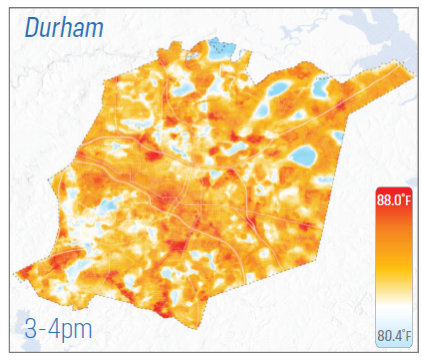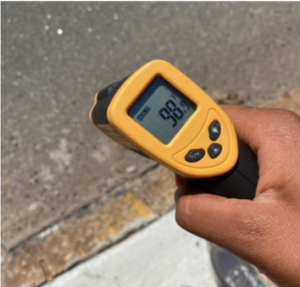New grant supports partnership with Durham Public Schools and Museum of Life and Science to develop hands-on STEM activities to engage students in learning about extreme heat
February 6, 2022
The Center for Public Engagement with Science (CPES) in the UNC Institute for the Environment (IE), in collaboration with the Community Engagement Core (CEC) of UNC’s NIEHS-funded Center for Environmental Health and Susceptibility (CEHS), received one of the first Climate Change and Human Health Seed Grants from Burroughs Wellcome Fund, for $45,000.
Led by CPES K-12 Science Education Manager Dana Haine, this funding supports a collaboration with science education specialists at Durham Public Schools (DPS) and staff from the Museum of Life and Science (MLS) who were involved in the National Integrated Heat Health Information System’s Raleigh and Durham Urban Heat Island Temperature Mapping Campaign that took place in summer 2021 in collaboration with the North Carolina State Climate Office.
Together, the project team will create, pilot and disseminate locally relevant, hands-on STEM activities to engage DPS students in learning about extreme heat and identifying actions that can be taken to address extreme heat in their community.
Having grown up in a world where the impacts of a changing climate are seen and felt daily, today’s youth are particularly in tune with hazards like extreme heat but may not feel equipped to address them. The activities developed through this work will invite youth to explore the nuances of extreme heat in their community, evaluate solutions that promote equity, and take health-protective actions.
The funding will enable Haine to bring DPS teachers on board to co-develop and pilot activities that feature Durham’s recently released heat maps. Students will interact with these heat maps to learn about the urban heat island (UHI) effect and to investigate connections between the UHI effect and other environmental and demographic factors. It also enables the purchase of STEM supplies to support MLS and DPS in implementing hands-on activities with youth.
This funding leverages the UNC-IE’s climate change education initiatives and expands the CEHS’s capacity to develop activities that incorporate current science on the health impacts of climate change. Max Cawley, MLS Program Manager for Public Engagement with Science and one of the coordinators for the Raleigh/Durham HeatWatch Campaign, and Linda Tugurian, DPS Coordinator of Secondary Programs and STEM Integration, are members of the CEHS Stakeholder Advisory Board. This board enables the CEC and UNC researchers to learn about and respond to the environmental health and science education needs of NC communities.
Students and teachers are not only important community stakeholders but also sources of local expertise when it comes to climate events, such as extreme heat. This is especially true about the urban heat island effect, which may have implications not only for human health but also for academic and scholastic performance and may contribute to learning loss.
“Involving students and teachers in this project is not only good pedagogy but also a responsible way of doing science,” says Cawley. “The processes of science don’t stop with data collection. We rely on students and teachers to help analyze, visualize, and contextualize new knowledge about the places they live; and they will help us find equitable solutions built from local priorities.”
“An exploration of extreme heat, particularly in cities where temperature can vary greatly from one street to another, combined with analysis of existing inequities that can amplify heat risk, is ripe for engaging youth,” says Haine. “It’s a relevant and timely issue where solutions and their trade-offs are still being explored.
 Funding will enable the purchase of hands-on STEM supplies such as infrared thermometers to enable youth to examine how surface temperatures vary across a school’s campus
Funding will enable the purchase of hands-on STEM supplies such as infrared thermometers to enable youth to examine how surface temperatures vary across a school’s campus“With NC Final Exam testing being eliminated for our Earth and Environmental Science course, DPS is exploring strategies for increasing student success in this course by moving beyond curriculum requirements to incorporate more place-based and culturally relevant learning opportunities into instruction,” says Tugurian. This personally relevant learning is especially critical in high school Earth & Environmental Science and AP Environmental Science courses, which fulfill a graduation requirement and impact all high school students.
Tugurian is enthusiastic about the outdoor and STEM-based learning opportunities this project will bring to both DPS teachers and students. For example, to help students discover the role of land use in the creation of urban heat islands, the educational materials developed also will get them outdoors on their school grounds to collect temperature data using handheld weather sensors and infrared thermometers. Their findings will help them to learn the science behind proposed solutions to reduce the UHI effect such as planting trees.
To prepare teachers to implement these activities during the 2022-2023 academic year, the project team will conduct teacher professional development workshops to showcase the curricula and model activities for teachers. By featuring researchers and practitioners from UNC and beyond, these workshops also will enable teachers to learn about current research taking place to reduce the urban heat island effect, examine the health impacts of extreme heat, and help communities adapt to a warmer climate.
“Through the development of engaging, science-based and health-centered STEM curricula and teacher professional development offerings, this project will bring a relevant topic and authentic learning opportunities to DPS classrooms filled with members of a population highly vulnerable to the impacts of climate change: our children, particularly those from low-income communities and communities of color,” says Haine.
To learn more about this initiative, contact Dana Haine at dhaine@unc.edu.
Dana Brown Haine, MS is the K-12 Science Education Manager for the Center for Public Engagement with Science. Haine is also an educator with the Community Engagement Core for the UNC Center for Environmental Health and Susceptibility in UNC’s Gillings School of Global Public Health and conducts outreach to K-12 audiences to increase understanding and application of current environmental health sciences research to reduce harmful environmental exposures in communities. This project will build on Haine’s climate and health work, which most recently involved the development of an online training module for public health professionals: Extreme Heat and Air Quality: Implications for Human Health.
